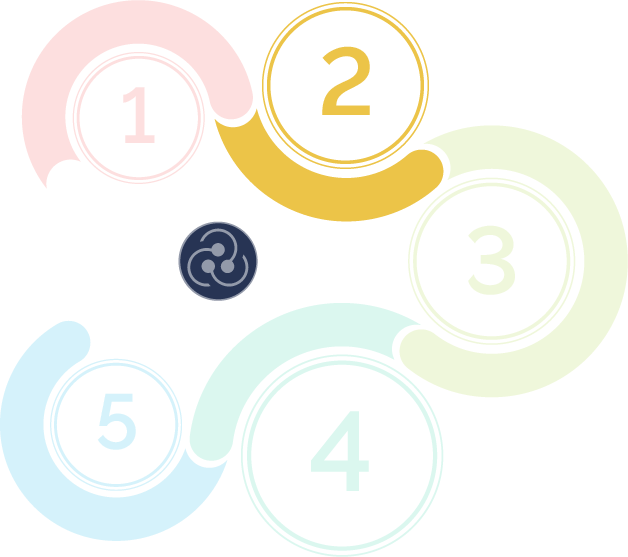Stage 2
Governance and Organizational Planning
In Stage 2, “Governance and Organizational Planning,” health care suppliers focus on establishing effective governance structures and integrating sustainability into their organizational planning.
This stage emphasizes the importance of leadership commitment, proposing a governance plan with clear steps for characterizing emissions and setting decarbonization goals, selecting metrics and standards, and having strategic alignment to drive sustainable practices throughout the organization. By implementing these measures, organizations can effectively integrate sustainability into their operations, ensure accountability, promote health equity, build partnerships, and enhance resilience.
Stage 1
Understanding and Navigating the Regulatory Landscape
Stage 2
Governance and Organizational Planning
Stage 3
Tackling Scope 1 & 2 Emissions
Stage 4
Tackling Scope 3 Emissions
Stage 5
Striving for Continuous Improvement

Stage 3
Tackling Scope 1 & 2 Emissions
Stage 1
Understanding and Navigating the Regulatory Landscape
=
Indicates the resource may require payment or be behind a paywall.
Actions
Make the case to organizational leadership
Key elements of the case might include: Return on Investment (ROI), business strategy, Key Performance Indicators (KPIs), operational resilience, reputational impacts, customer/shareholder perspective competitive advantage, cost savings, community benefits & health equity, etc.
Accelerating Health Equity and Business Resilience through Decarbonization
The 1.5°C Business Playbook
The Green Print: Advancement of Environmental Sustainability in Healthcare
Health Sector CARES Pledge
Propose a governance plan outlining steps to establish, define, and catalog carbon emissions. This plan should include the creation of decarbonization objectives, accountability measures, reporting structures, governance processes, performance metrics, and a timeline/transition strategy
- Establish a lead sustainability champion and cross-functional team to define climate strategy and roadmap, including timelines and short, medium and long term goals
- Measure Scope 1 and 2 baseline emissions (Scope 3 categories where relevant or possible) using GHG protocol accounting
- Identify achievable science-based goals/targets for all scopes
- Establish process/procedures for conducting a robust, science-based climate risk and opportunity assessment
- Incorporate health equity within the governance plan/steps
- Benchmark and assess staffing/resource needs
- Identify financial impact metrics, expenditure metrics, and financial estimates and assumptions
- Define a reporting strategy for internal and external stakeholders
- Identify potential funding sources
- E.g., state/federal grants or other incentives
The 1.5°C Business Playbook
Moving Forward Guide
GHG Protocol
GHG Protocol Online Training
FAQs on Target Setting (SBTi)
Accelerating Health Equity and Business Resilience through Decarbonization
Task force on Climate-related Financial Disclosures (TCFD)
TCFD Knowledge Hub
Risk Identification and Site Criticality Toolkit
Microsoft Sustainability Learning Center
Sustainability Accounting Standards Board (SASB)
SASB Materiality Finder
CDP
Global Reporting Initiative
Energize
Activate Program
Renewable Thermal Collaborative
Assess potential partnerships/collaborations with others to build resilience and achieve sustainability goals
E.g., more efficient energy sources, use of AI and other tools to reduce carbon footprint, regional infrastructure improvements, development of a systematic way to use data systems and analytics to measure and manage progress, and to access comparable data sets and deliver critical data to health systems
Decarbonising Healthcare Supply Chains
EcoVadis
Renewable Thermal Collaborative
Best Practices from Top Reprocessing Hospitals
Assess the impact of environmental risk factors and their implications for health equity
Develop an agenda/plan that infuses health equity and community engagement to address the health disparities exacerbated by those environmental risk factors
Accelerating Health Equity and Business Resilience through Decarbonization
Consider how to create transparency/reporting on results
E.g., Scoping for own ESG reports
CDP
Global Reporting Initiative
Overview report: Embedding environmental sustainability into pharma’s DNA
Select metrics & reporting standards for:
- Scopes 1-3, e.g., Greenhouse gas protocol, CDP, Global Reporting Initiative (GRI), Sustainability Accounting Standards Board (SASB), Task force on Climate-related Financial Disclosures (TCFD)
- Establish a baseline
- Resilience, e.g., scope and frequency of assessing physical and transitional climate risk of own operations and most significant suppliers
CDP
Task force on Climate-related Financial Disclosures (TCFD)
GHG Protocol
Sustainability Accounting Standards Board (SASB)
Global Reporting Initiative
GHG Protocol Online Training
Microsoft Sustainability Learning Center
TCFD Knowledge Hub
Risk Identification and Site Criticality Toolkit
Where necessary, develop climate response plans that support employee health and availability, including transportation, food, emergency shelter, generators, etc.
Disaster Available Supplies in Hospitals (DASH) tool
Risk Identification and Site Criticality Toolkit
Sustainability Roadmap for Health Care
Potential Challenges
Leadership Buy-in
Gaining leadership commitment and support for sustainability initiatives may require overcoming skepticism or competing priorities
The 1.5°C Business Playbook
The Green Print: Advancement of Environmental Sustainability in Healthcare
Accelerating Health Equity and Business Resilience through Decarbonization
Role Clarity and Capacity
Clearly defining roles and responsibilities for sustainability and ensuring adequate resources and capacity to fulfill those roles can be challenging
Moving Forward Guide
Microsoft Sustainability Learning Center
Sustainability Roadmap for Health Care
Cultural Shift
Nurturing a sustainability-focused culture may require changing mindsets, behaviors, and practices within the organization
The 1.5°C Business Playbook
Moving Forward Guide
Overview report: Embedding environmental sustainability into pharma’s DNA
Data Collection and Reporting
Establishing effective systems for collecting and reporting sustainability data can be complex, particularly when data sources are dispersed across different functions
GHG Protocol
GHG Protocol Online Training
Global Reporting Initiative
CDP
Sustainability Accounting Standards Board (SASB)

